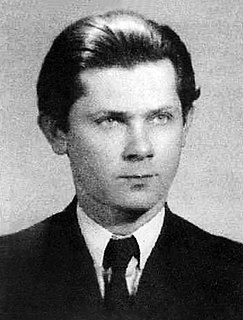A Quote by Cassandra Clare
Inanimate objects are harmless indeed, Mr. Mortmain. But one cannot always say the same of the men who use them.
Related Quotes
Justice is the recognition of the fact that you cannot fake the character of men as you cannot fake the character of nature, that you must judge all men as conscientiously as you judge inanimate objects, with the same respect for truth, with the same incorruptible vision, by as pure and as rational a process of identification-that every man must be judged for what he is and treated accordingly.
Inanimate objects are always correct and cannot, unfortunately, be reproached with anything. I have never observed a chair shift from one foot to another, or a bed rear on its hind legs. And tables, even when they are tired, will not dare to bend their knees. I suspect that objects do this from pedagogical considerations, to reprove us constantly for our instability.
I must indeed abide the Doom of Men whether I will or nill: the loss and the silence. But I say to you, King of the Numenoreans, not till now have I understood the tale of your people and their fall. As wicked fools I scorned them, but I pity them at last. For if this is indeed, as the Elves say, the gift of the One to Men, it is bitter to receive.
You must not say that this cannot be, or that that is contrary to nature. You do not know what Nature is, or what she can do; and nobody knows; not even Sir Roderick Murchison, or Professor Huxley, or Mr. Darwin, or Professor Faraday, or Mr. Grove, or any other of the great men whom good boys are taught to respect. They are very wise men; and you must listen respectfully to all they say: but even if they should say, which I am sure they never would, 'That cannot exist. That is contrary to nature,' you must wait a little, and see; for perhaps even they may be wrong.
Well, it seems a bit silly, looking there,” said Will. “It’s not like Mortmain’s going to lodge a complaint against the Shadow-hunters through official channels. ‘Very upset Shadowhunters refused to all die when I wanted them to. Demand recompense. Please mail cheque to A. Mortmain, 18 Kensington Road—
Inanimate objects can be classified scientifically into three major categories: those that don't work, those that break down and those that get lost. The goal of all inanimate objects is to resist man and ultimately to defeat him, and the three major classifications are based on the method each object uses to achieve its purpose. As a general rule, any object capable of breaking down at the moment when it is most needed will do so.
There is nothing more terrible, I learned, than having to face the objects of a dead man. Things are inert: that have meaning only in function of the life that makes use of them. When that life ends, the things change, even though they remain the same. […] they say something to us, standing there not as objects but as remnants of thought, of consciousness, emblems of the solitude in which a man comes to make decisions about himself.
With experience it seems to be possible to control the flow of paint, to a great extent, and I don't use - I don't use the accident - 'cause I deny the accident... it's quite different from working, say, from a still life where you set up objects and work directly from them. I do have a general notion of what I'm about and what the results will be. I approach painting in the same sense as one approaches drawing, that is, it's direct.
For the historian everything begins and ends with time, a mathematical, godlike
time, a notion easily mocked, time external to men, 'exogenous,' as economists
would say, pushing men, forcing them, and painting their own individual times
the same color: it is, indeed, the imperious time of the world.
Differences in political opinions are as unavoidable as, to a certain point, they may perhaps be necessary; but it is exceedingly to be regretted that subjects cannot be discussed with temper on the one hand, or decisions submitted to without having the motives, which led to them, improperly implicated on the other; and this regret borders on chagrin when we find that men of abilities, zealous patriots, having the same general objects in view, and the same upright intentions to prosecute them, will not exercise more charity in deciding on the opinions and actions of one another.


































